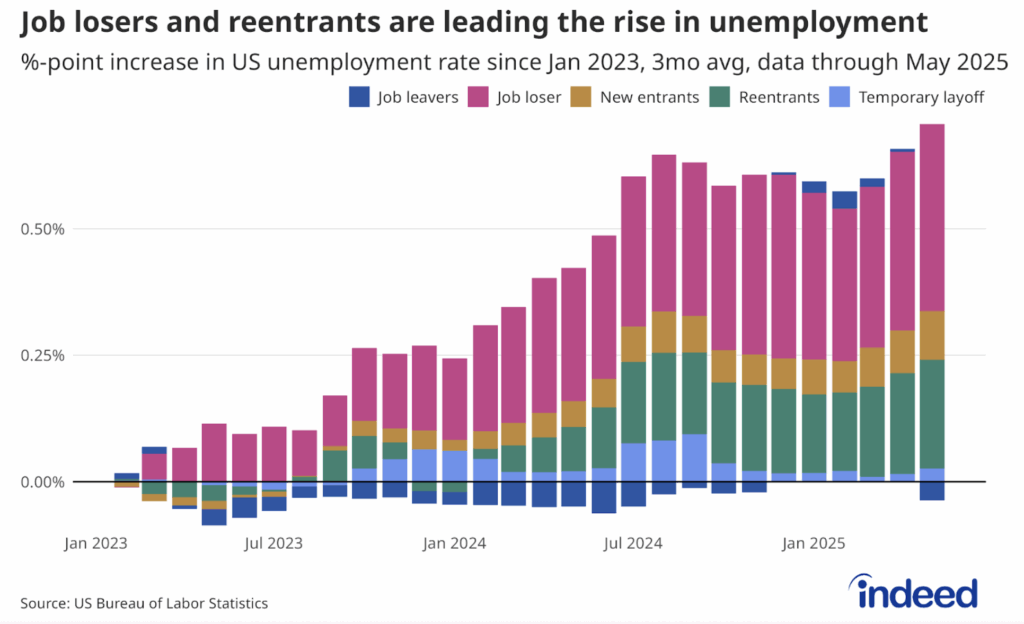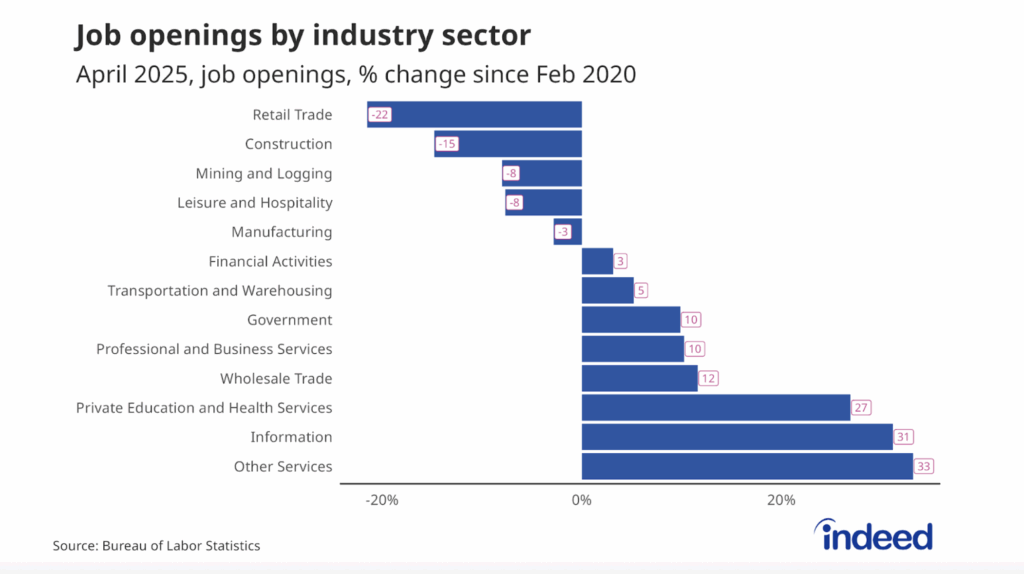Key Points
- The share of postings on Indeed for crypto and blockchain jobs jumped 118% as of July 16 compared with last year’s low.
- Crypto and blockchain jobs are expanding beyond software development into support functions like accounting and human resources.
- In June 2021, 44% of crypto software development jobs posted on Indeed were remote, compared with 31% of all other software development jobs postings.
The spotlight has been on cryptocurrencies lately, especially as the US government ponders reporting protocols and taxes on crypto assets. That’s a far cry from a few years ago when cryptocurrencies were a fringe phenomenon at best. While the jury’s still out on the long-term place of cryptocurrencies, businesses devoted to crypto have mushroomed and blockchain technology has proliferated beyond its bitcoin roots.
Crypto’s popularity is visible in the labor market, where the share of crypto and blockchain job postings on Indeed, though still small, is soaring. Crypto job postings now include functions like finance and marketing that go beyond mining and trading of these digital assets, a sign the industry is maturing.
Crypto and blockchain jobs growing fast
The share of job postings that used terms related to crypto or blockchain was relatively steady from mid-2019 until the pandemic struck. After tumbling 16% from the seven days ending February 1, 2020 to the comparable period ending July 1, 2020, they continued to languish into the fall. Mid-November was a turning point. Not only did the share of crypto and blockchain job postings return to its pre-pandemic level, it substantially rose, climbing 118% from the seven days ending September 5, 2020, its low last year, to the seven days ending July 16, 2021.
While it’s tough to pinpoint the exact reason for the rise, it occurred just when crypto values surged at the end of 2020. The prices of Ethereum and Bitcoin, the two leading cryptocurrencies in market size, skyrocketed, with Dogecoin coming along for the ride mid-spring. For many crypto and blockchain companies, the price surges increased demand and revenue, in turn spurring hiring.
The crypto job mix is changing
While nearly 30% of all crypto and blockchain job postings are in software development, the composition has shifted noticeably in the past year. In the seven days ending July 16, 2020, finance, marketing, human resource, and accounting jobs made up 16.8% of postings in the field, nearly double the share a year ago.
This shift highlights the maturation of the crypto and blockchain industry. Any business eventually hits a point where operations expand beyond core technical functions, requiring employees with different skills sets. That’s now happening at a greater pace in crypto and blockchain.
Large portion of crypto and blockchain jobs are remote
A frequent cryptocurrency selling point is that they’re borderless, thanks to the decentralized blockchain ledger technology underlying them. That decentralization makes many crypto and blockchain jobs highly suitable for remote work.
In June 2021, 36% of all crypto and blockchain job postings specified remote work. For software development jobs in the field, the share was 44%. That’s far above the 7% remote share for all other Indeed job postings and the 31% share for software development roles outside crypto and blockchain. This could help draw software development workers seeking remote opportunities to the industry.
Job seeker interest rises
Job seeker interest in crypto and blockchain jobs has also taken off. In the seven days ending July 16, 2021, the share of crypto-related searches catapulted 300% from the comparable period ending Sept 1, 2020. It’s a similar story for blockchain-related searches, which shot up 137% over the same time frame.
Just like job postings, the rise in searches took place just as cryptocurrency values took off. Specifically, crypto- and blockchain-related searches were strongly correlated with Bitcoin and Ethereum prices.
Rising coin prices are good news for the crypto and blockchain job market, but it’s detrimental when there’s a crash. It’s too early to say whether the crypto and blockchain labor market dynamics are unique, but industry hiring appetite and job seeker interest may react to price fluctuations more swiftly than in other sectors.
Conclusion
Crypto and blockchain have transformed in just a few years from little-known technologies to a burgeoning industry whose share of job postings on Indeed has risen rapidly. Meanwhile, the field has stepped up hiring for support functions like human resources and marketing. Software development workers who want remote positions are more likely to find suitable openings in crypto and blockchain than among developer jobs more broadly.
Job seekers are noticing the opportunities in the industry. The share of crypto- and blockchain-related searches has risen astronomically since last fall.
The big unknown is what will happen to the crypto and blockchain job markets if cryptocurrency prices crash. These unregulated digital assets are notoriously volatile. Only time will tell if the crypto and blockchain industry will be strong enough to weather the booms and busts that inevitably lie ahead.
Methodology
We define crypto and blockchain job postings using an extensive list of terms related to cryptocurrencies, digital assets, and blockchain technology. Examples of terms include “cryptocurrency,” “blockchain,” “bitcoin,” and “cryptomining.” A job posting is flagged as crypto or blockchain if the text includes such a crypto or blockchain term. Searches related to crypto and blockchain are defined through the same list of terms.
We identify job postings as open to remote work if the job title or description include terms like “remote work,” “telecommute,” “work from home,” or similar terms, or if the location is explicitly listed as remote. These postings include both permanently and temporarily remote jobs, though employers often don’t specify.
Correlations related to postings were run on the seven-day moving average of the share of crypto and blockchain job postings per million and the closing prices of Bitcoin and Ethereum reported on Yahoo Finance from September 1, 2020 to July 16, 2021. Correlations related to searches were run on the respective seven-day moving averages of the shares of crypto and blockchain searches per million and the closing prices of Bitcoin and Ethereum from September 1, 2020 to July 16, 2021. All correlation results were greater than 0.7.






